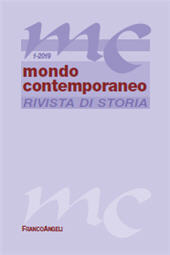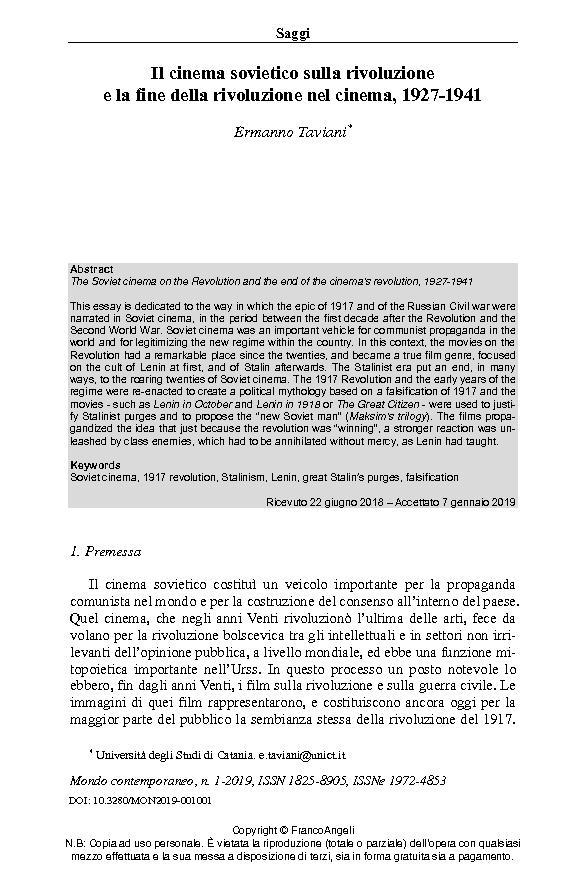Il cinema sovietico sulla rivoluzione e la fine della rivoluzione nel cinema, 1927-1941
5-34 p.
Questo saggio è dedicato al modo in cui l'epopea del 1917 e la guerra civile sono state raccontate nel cinema sovietico, nel periodo compreso tra il primo decennale della rivoluzione e la seconda guerra mondiale. Il cinema sovietico costituì un veicolo importante per la propaganda comunista nel mondo e per la legittimazione del nuovo regime all'interno del paese. In questo quadro, un posto notevole lo ebbero, fin dagli anni Venti, i film sulla rivoluzione che diventarono un vero e proprio genere cinematografico, incentrato sul culto di Lenin, prima, e di Stalin, poi. L'epoca staliniana pose fine, per molti versi, ai ruggenti anni Venti del cinema sovietico. La rivoluzione del '17 e i primi anni del regime vennero rievocati per creare una mitologia politica fondata su una falsificazione del 1917 e i film - come ad esempio Lenin in Ottobre e Lenin nel 1918 o Il grande cittadino - furono usati per giustificare le purghe staliniane e per proporre l'"uomo nuovo" sovietico (la trilogia di Maksim).
I film propagandarono l'idea che proprio perché la rivoluzione stava "vincendo", più forte si stava scatenando la reazione dei nemici di classe, che andavano annientati senza pietà, come aveva insegnato Lenin. [Testo dell'editore].
This essay is dedicated to the way in which the epic of 1917 and of the Russian Civil war were narrated in Soviet cinema, in the period between the first decade after the Revolution and the Second World War. Soviet cinema was an important vehicle for communist propaganda in the world and for legitimizing the new regime within the country. In this context, the movies on the Revolution had a remarkable place since the twenties, and became a true film genre, focused on the cult of Lenin at first, and of Stalin afterwards. The Stalinist era put an end, in many ways, to the roaring twenties of Soviet cinema. The 1917 Revolution and the early years of the regime were re-enacted to create a political mythology based on a falsification of 1917 and the movies - such as Lenin in October and Lenin in 1918 or The Great Citizen - were used to justify Stalinist purges and to propose the "new Soviet man" (Maksim's trilogy).
The films propagandized the idea that just because the revolution was "winning", a stronger reaction was unleashed by class enemies, which had to be annihilated without mercy, as Lenin had taught. [Publisher's text].
-
Articles from the same issue (available individually)
-
-
Information
ISSN: 1972-4853
DISCIPLINES
KEYWORDS
- Cinema sovietico, rivoluzione del 1917, stalinismo, Lenin, grandi purghe staliniane, falsificazione
- Soviet cinema, 1917 revolution, Stalinism, Lenin, great Stalin's purges, falsification



